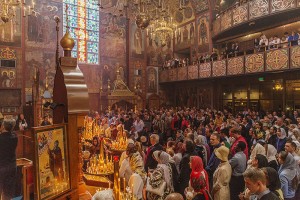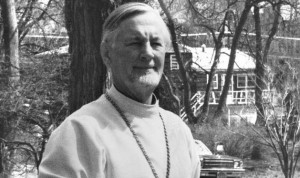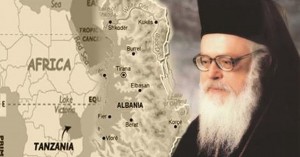Today “mission” is not just a fashionable word among the Orthodox, it is a fashionable trend. It is spoken of at all levels, from the Primate of the Church to simple parishioners. Everyone sees themselves as missionaries, bearing the Word of Life to people, burning lights, the salt of the earth. We readily write and talk about faith and Christianity; we have become adept at speaking the necessary and proper words. Priests have learned how to read smooth, rhetorically competent sermons; parishioners have learned how to talk with visitors kindly and cordially. We explain where to put up candles and how to write commemoration sheets, how to go to Confession and Communion.
It seems that we are open to the world, that we are going out to meet it with our word. But the world escapes from us, slipping through our hands, and our catch is paltry. Useless fishers of men, we are not prepared to admit defeat, explaining everything away by the impoverishment of love in the world and by enemy opposition. And we tirelessly continue our work. Of course! After all, we are missionaries!
 Today there are many “missionary projects” and brotherhoods. Representatives of the Transfiguration Assembly of Small Orthodox Brotherhoods held a book presentation at the recent Boo!Fest. [1] They saw themselves as educators; they were ideal missionaries: open and friendly, readily answering questions. They were exactly like Protestant preachers, knowing all the answers to all the questions, having resolved all the problems for themselves. And in this knowledge was a certain, subtle taste of an advertising campaign. As in: we will tell you everything about this amazing vacuum cleaner – we know how it is constructed to the very last screw and how it operates. We will smile at you so that you will buy our vacuum cleaners. And if you should turn around and leave, we will not be offended: you simply have not attained to the level of our products. There is puppetry and a certain disengaged readiness to talk to you. This person appears to be talking about himself, but he seems like a character out of a book. You do not see the real him, suffering and searching – he is hiding behind his “missionary work.” You extend your hand to feel human warmth, but instead you feel the handle of a vacuum cleaner.
Today there are many “missionary projects” and brotherhoods. Representatives of the Transfiguration Assembly of Small Orthodox Brotherhoods held a book presentation at the recent Boo!Fest. [1] They saw themselves as educators; they were ideal missionaries: open and friendly, readily answering questions. They were exactly like Protestant preachers, knowing all the answers to all the questions, having resolved all the problems for themselves. And in this knowledge was a certain, subtle taste of an advertising campaign. As in: we will tell you everything about this amazing vacuum cleaner – we know how it is constructed to the very last screw and how it operates. We will smile at you so that you will buy our vacuum cleaners. And if you should turn around and leave, we will not be offended: you simply have not attained to the level of our products. There is puppetry and a certain disengaged readiness to talk to you. This person appears to be talking about himself, but he seems like a character out of a book. You do not see the real him, suffering and searching – he is hiding behind his “missionary work.” You extend your hand to feel human warmth, but instead you feel the handle of a vacuum cleaner.
This is what all our missionary work is like: thought up in the head and then turned into a project, a presentation; a massive campaign with shares, the showing of slides, and the distribution of bonuses in the form of friendliness. Therefore, all attempts to “convert the unbelieving” seem inappropriate and intrusive. Why? After all, we want things to be for the better. We study theology, dogmatics, and exegetics; we read smart books and learn how to talk smoothly; we know at what point in the Mystery of the Liturgy the Holy Spirit descends and how He transforms the wine and bread into the Blood and Body of Christ. We have studied the basics of faith, as Protodeacon Andrei Kuraev has advised us, but it is of no use…
Today the entire world lives by words. No, not by the Word, but namely by words, ideas, phrases, paradoxes, and word games. Our times can be called the blah-blah-blah-era. People see the world through advertisements and demotivators, through news releases and political speeches. In fact, we all live continuously in the information flow, like fish in water. Information noise surrounds us on all sides: at work, at home, on the road. Moreover, it is multidirectional and chaotic, reminiscent of Brownian motion, in which all roads and paths have long ago disappeared. What paths can there be in kasha? Or in soup? We taste one thing, and then another – we have become gourmet consumers, consumers of information.
Where is the voice of the Church is this noise? It is audible? And what should be done to make it heard, apart from shouting? Shout in a different language? Wear bright badges and wave flags? Go to demonstrations? Perhaps one needs to say something that no one has ever heard before?
To speak frankly, within this information noise the Church’s voice is just one of its multiplying factors. Our missionary projects are nothing more than one more information flow – one that is fairly weak, often unprofessional, and generally limp and boring – that is being drowned and lost among others. Should it be made more cheerful? Should it be decorated with pictures? This is pointless, for we are only one among the crowd.
We take offence that we are neither heard nor listened to, explaining this away by demons, by spiritual wickedness in high places, by the imperfections of the church media, or by the lack of professionals. But the fact is that we are simply one piece on the information field. We are the same as everyone else. We do not differ from those who are fighting for the presidency, from those who under noble pretexts legally rob the elderly and poor, from those who come out either against abortion or for abortion, from those who are ruining education, or from those who are producing news programs along the principles of “the more horrible, the cooler.”
Well, yes. We see ourselves as different; we know that we are bearers of the Good News. But, unfortunately, we are the only ones who know this. We appear to others as salespeople or insurance agents, who knock at your door with an offer to insure your life advantageously; so you can invest now so that, when you die, you will not end up at a bad resort.
All the while, we feel that we should be listened to and heard. After all, we are so knowledgeable (see above). Moreover, we think of the experience of the first Christians, who went out to preach and converted the entire world. We, too – we, too! – should be like them.
First of all, however, we are all loaded down by such enormous cultural and historical baggage that we cannot think of ourselves as poor, destitute, persecuted, and despised Jews, as such “dirty foreigners,” to acquire sufficient humility in our language.
The first Christians were “passing through”; they were not guardians of an “enormous cultural and historical heritage.” Some listened to them, others did not: they were not spoiled by imperial favor or by the experience of the symphony of powers of state and church; Christians seemed to be strangers and pilgrims on earth.
The most ancient form of church communities, headed by a bishop, bore the Greek name “paroikia” (in Slavonic, and later in Ukrainian, this was pronounced like “parokhiia” and “parafiia”; in Russian it became “prikhod” [parish]; the word “paroikia” was later changed to “episkopi” with the increase of Christians.) The word describes a settlement of a certain kind of people among those foreign to them – in other words, a colony. This expressed the sense that Christians, having established a community among the pagans of a given town, were as immigrants among them. Practically every adult knows what it is like to visit an unfamiliar city – this is the sense, in principle, with which the first Christians had to live.
What happened later? We began to dominate ideologically, culturally, architecturally, materially, and so on – which naturally changed our mentality. And what happened even later? Just compare a city’s tallest church with its secular buildings, not even necessarily the tallest. Churches as the dominant urban architecture is a thing of the distant past. The same correlation has likewise affected other parts of our existence. Yet we have maintained this claim to dominance.
In effect, we all know this. The first Christians were a challenge to the world, a paradox; they were somehow inexplicable. And if we want to “liken ourselves” to them, we should not carry out a mission that has today become akin to an advertizing campaign. We should act in contrary manner: the theologically paradoxical thing would be to keep quiet. Not to multiply information noise, but to destroy it. The Church should present itself to the world as a territory of unusual, heavenly quiet and repose, not one of vain and incessant chatter; it should be far from the life of those who studiously parrot everything that has been written in the two-thousand-year history of Christianity.
What, then, about preaching Christ? Are we not called to do this? Yes, we should, but not by words only. Only by life. Only by living daily and independently (in however crooked and stumbling a manner) in faith and love.
Try to be Christians, all the while not pronouncing the words fasting, prayer, confession, preaching. Speak in human language about things that people can understand – and even then, only when asked. Weep with those who are weeping, rejoice with those who are rejoicing. Be with people in a real way, with all your heart, with all your strength – and not with words. Be with them unselfishly, without the goal of converting them to faith. Try to be Christians without saying a word about it.
Translator’s note:
[1] The Transfiguration Assembly of Small Orthodox Brotherhoods is an informal brotherhood made up of a network of lay communities. It was formed in 1990 (although with roots going back to the 1960s) by the controversial Fr. George Kochetkov, who continues to be its spiritual guardian. It is dedicated in large part to mission and catechesis.
The Boo!Fest is an “alternative” book festival for small and independent publishers held annually in Moscow.
Translated from the Russian.



















